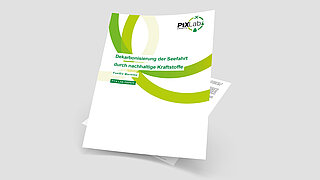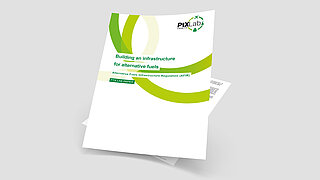Green hydrogen as the key to greenhouse gas-neutral maritime transport
Global shipping is growing – and so are the sector’s greenhouse gas emissions. Synthetic, green fuels made with Power-to-X technologies are set to play a key role in achieving net zero emissions by 2050. PtX Lab Lausitz is now working on strategies for climate-friendly shipping.
Currently, the shipping sector is responsible for around 2.5 percent of global greenhouse gas emissions. Assuming general conditions stay the same, the International Maritime Organisation (IMO) has estimated that the volume of ocean-going traffic could rise by up to 250 percent by 2050. The corresponding rise in greenhouse gas emissions that this implies would endanger the Paris Agreement targets.
Apart from greenhouse gas emissions, shipping also impacts the environment with noise, sulphur dioxide emissions and water pollution. To stay within the 1.5 degrees Celsius target of the Paris Agreement, this sector must become greenhouse gas-neutral by 2050. This applies both to goods transportation and to tourism.
EU-wide funding efforts for greenhouse gas-neutral shipping
The EU Commission intends to incorporate shipping into its climate targets for 2030 and 2050, and has included a set of proposals in its ‘Fit for 55’ package of measures that aim to bring shipping into the emission trading system (ETS) while incentivising the use of sustainable fuels. The overall objective is to achieve a reduction in average greenhouse gas emissions for energy used on board of 6 percent by 2030 and 75 percent by 2050. This will not be enough to achieve the Paris climate targets, however, and further measures will need to be taken.
Prompt and practical solutions are needed
A number of factors also need to be accounted for. Shipbuilding requires a high level of investment, which may mean that the finished vessel is in service for over 30 years. Any ships launched over the next few years will therefore in all probability still be part of the international shipping fleet even in 2050. Ideally, solutions to reduce greenhouse gases should therefore be readily deployable and also suitable for use as a retrofit.
The use and availability of cost-effective, greenhouse gas-neutral fuels is a key precondition for achieving climate goals in the shipping sector. Other technical and non-technical solutions are also possible. Reducing shipping speeds or improving the design of the vessel body are just two examples of approaches that can start saving emissions immediately.
Synthetic fuels based on green hydrogen
For the foreseeable future, direct electrification will not be an option for international shipping. Greater flexibility is offered by the shipping sector, however, thanks to its lower requirements for fuel energy density compared with aviation. Alongside green fuel types such as synthetic diesel, ammonia or methanol, which can be obtained with Power-to-Liquid (PtL) methods, gaseous fuels (Power-to-Gas, PtG) are also another potential option. This offers a key advantage: the continued use of existing ship drive systems and infrastructure. As a basic requirement for achieving net zero emissions, however, the synthetic fuel used must have been produced with green hydrogen. Advanced sails and wind power systems will also play a key role in the future as ancillary drive systems that help to lower fuel needs.
PtX Lab Lausitz to develop strategies for greenhouse gas-neutral shipping
PtX Lab Lausitz will investigate technologies and draw up strategies that will aid in the transition of shipping to net zero emissions. The Lab will also contribute to discussions of the kinds of policy, regulatory and economic frameworks that are needed to enable greater investment in climate-friendly fuels from the various PtX technologies. PtX Lab will also be working to ensure the availability of climate-neutral fuels and certification according to strict, internationally recognised sustainability standards, as well as creating incentives for stimulating demand at a national and European level.
Decarbonisation of shipping through sustainable fuels
PtX Lab Paper | June 2025 | Topic: Shipping | 6 Pages
Building an infrastructure for alternative fuels
PtX Lab Paper | 06/2025 | Topic: Shipping | 4 Pages


